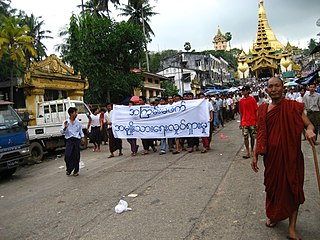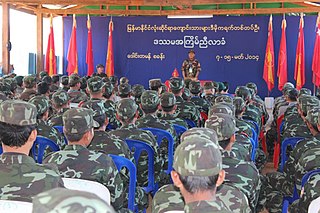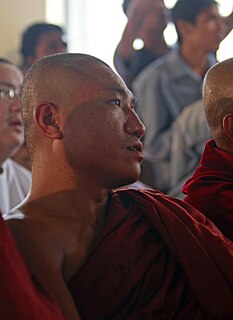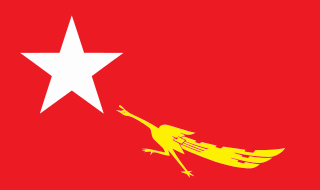The Burma Digest is a weekly bilingual online journal, published by the Democracy for Burma Alliance, a web-based campaign group set up by Burmese refugees and human rights activists worldwide. It features articles written both in English and Burmese.
The Burma Digest, as well as all other campaign activities of the Democracy for Burma Alliance are 100% non-profit and volunteering-based. The publication is fully available for reading on Democracy for Burma Alliance's main page [www.tayzathuria.org.uk ]and on blog [www.burmadigest.wordpress.com]. Printable booklets are also offered for downloading and free distribution.
The first edition of the Burma Digest appeared in June 2005, featuring only three articles, in English. Nowadays, the average issue of the Burma Digest features more than ten articles in English, and ten in Burmese, as well as interviews with personalities involved in the struggle for democracy in Burma and political dissidents, a newsroom and photo gallery
As a pro-democracy journal, the Burma Digest makes a strong statement against totalitarian regimes, considering the currently ruling military junta as illegitimate and defending Burmese people's right to fundamental freedoms. The beliefs the Burma Digest is aimed to represent and to support are stated on the journal's website and blog:
As a campaign journal for democracy and human rights, the Burma Digest publishes articles mostly (though not exclusively) on social and political issues. However, the Burma Digest, as well as the Democracy for Burma Alliance is not directly affiliated to any political party, ethnic group or organization. It is a space of freedom of speech, reuniting diverse views and opinions. If certain articles show either support or disagreement towards certain organisations or issues, it is only based on the publication's values and beliefs concerning democracy and human rights.
Each year, (starting from August 8, the day of the commemoration of 8888 Uprising, until the next August 8, the Burma Digest offers an award for Burmese language articles and poetry. Each month, two articles and two poems are nominated, then the winner is chosen out of 5 finalists articles/poems.
The prize for the best article is USD 250. The prize for the best poem is USD 150. This project and the prizes are funded by donations.

Myanmar operates de jure as a unitary assembly-independent republic under its 2008 constitution. On 1 February 2021, Myanmar's military took over the government in a coup, causing ongoing anti-coup protests.

Human rights in Myanmar under its military regime have long been regarded as among the worst in the world. International human rights organisations including Human Rights Watch, Amnesty International, and the American Association for the Advancement of Science have repeatedly documented and condemned widespread human rights violations in Myanmar. The Freedom in the World 2011 report by Freedom House notes that "The military junta has... suppressed nearly all basic rights; and committed human rights abuses with impunity." In 2011 the "country's more than 2,100 political prisoners included about 429 members of the NLD, the victors in the 1990 elections." As of July 2013, according to the Assistance Association for Political Prisoners, there were about 100 political prisoners in Burmese prisons.

The Democratic Party for a New Society is a registered political party in Myanmar (Burma), founded in 1988 by Moe Thee Zun, the then Secretary General of the All Burma Students League (ABSL). The party campaigns independently from other parties and is unaffiliated with the more influential National League for Democracy (NLD), despite sharing similar goals.
The Euston Manifesto is a 2006 declaration of principles signed by a group of academics, journalists and activists based in the United Kingdom, named after the Euston Road in London where it had its meetings. The statement was a reaction to what the writers argued to be widespread violations of left-wing principles by others who were commonly associated with the Left. The manifesto states that "the reconfiguration of progressive opinion that we aim for involves drawing a line between forces on the Left that remain true to its authentic values, and currents that have lately shown themselves rather too flexible about these values".

Paw Oo Tun ; better known by his alias Min Ko Naing, is a leading democracy activist and dissident from Myanmar. He has spent most of the years since 1988 imprisoned by the state for his opposition activities. The New York Times has described him as Burma's "most influential opposition figure after Daw Aung San Suu Kyi".

Plaid Ifanc is the youth and student wing of Plaid Cymru, a political party in Wales.
Ethnic democracy is a political system that combines a structured ethnic dominance with democratic, political and civil rights for all. Both the dominant ethnic group and the minority ethnic groups have citizenship and are able to fully participate in the political process. Ethnic democracy differs from ethnocracy in that elements of it are more purely democratic. It provides the non-core groups with more political participation, influence and improvement of status than ethnocracy supposedly does. Nor is an ethnic democracy a Herrenvolk democracy which is by definition a democracy officially limited to the core ethnic nation only.

Liberal democracy is the combination of a liberal political ideology that operates under an indirect democratic form of government. It is characterized by elections between multiple distinct political parties, a separation of powers into different branches of government, the rule of law in everyday life as part of an open society, a market economy with private property, and the equal protection of human rights, civil rights, civil liberties and political freedoms for all people. To define the system in practice, liberal democracies often draw upon a constitution, either codified or uncodified, to delineate the powers of government and enshrine the social contract. After a period of expansion in the second half of the 20th century, liberal democracy became a prevalent political system in the world.

The Saffron Revolution was a series of economic and political protests and demonstrations that took place during August, September, and October 2007 in Myanmar. The protests were triggered by the decision of the national military government to remove subsidies on the sales prices of fuel. The national government is the only supplier of fuels and the removal of the price subsidy immediately caused diesel and petrol prices to increase by 66–100% and the price of compressed natural gas for buses to increase 500% in less than a week.

The All Burma Students' Democratic Front is an opposition group in Myanmar. It was founded on 1 November 1988, after the 8888 protests in Yangon. The group's leadership consists mostly of former student exiles.
Tharwa Foundation is a nonprofit, nonpartisan grassroots organization that encourages diversity, development and democracy in Syria and the broader Middle East/North Africa. The Foundation derives its name from the Arabic word, tharwa. Founded in 2003, the Tharwa Foundation is an offshoot of the Tharwa Project, an initiative launched in Damascus Syria by Ammar Abdulhamid and Khawla Yusuf. Abdulhamid is a blogger, human rights activist and author. Yusuf is an author, politician, and human rights activist.
Zoya Phan is a Burmese political activist. She resides in the United Kingdom, and is the Campaign Manager of the human rights organization Burma Campaign UK. She was an outspoken critic of the Burmese government when it was under direct military rule, repeatedly calling for democratic reform in Burma, as well as economic sanctions from both the British government and the United Nations. Following political changes in the country from 2011, she has continued to campaign for international action to end ongoing human rights violations, especially regarding the use of rape and sexual violence against ethnic women by the Burmese Army.

The Shan Nationalities League for Democracy is a political party in Myanmar (Burma). The party was established on 26 October 1988, and campaigns for the interests of the Shan people. The SNLD became the largest Shan party in the Assembly of the Union following the 2015 general election. The party is a federal party having local branches in most townships in Shan State and few in other states and regions such as Kayah, Kachin, and Mandalay.

Nyi Nyi Lwin, more widely known by his monastic name U Gambira, is a former Buddhist monk, activist and a leader of the All-Burma Monks' Alliance, a group which helped lead the 2007 protests against Burma's military government. Following the protests, he went into hiding and published two editorials critical of the Burmese government in The Washington Post and The Guardian on 4 November 2007. He was arrested the same day.

The Transitional Government of Ethiopia (TGE) was an era established immediately after the Ethiopian People's Revolutionary Democratic Front (EPRDF) seized power from the Marxist-Leninist People's Democratic Republic of Ethiopia (PDRE) in 1991. During the transitional period, Meles Zenawi served as the president of the TGE while Tamrat Layne was prime minister. Among other major shifts in the country's political institutions, it was under the authority of the TGE that the realignment of provincial boundaries on the basis of ethnolinguistic identity occurred. The TGE was in power until 1995, when it transitioned into the reconstituted Federal Democratic Republic of Ethiopia that remains today.

The 2011–2020 Myanmar political reforms were a series of political, economic and administrative reforms in Myanmar undertaken by the military-backed government. These reforms include the release of pro-democracy leader Aung San Suu Kyi from house arrest and subsequent dialogues with her, establishment of the National Human Rights Commission, general amnesties of more than 200 political prisoners, institution of new labour laws that allow labour unions and strikes, relaxation of press censorship, and regulations of currency practices. As a consequence of the reforms, ASEAN has approved Myanmar's bid for the chairmanship in 2014. United States Secretary of State Hillary Clinton visited Myanmar on 1 December 2011, to encourage further progress; it was the first visit by a Secretary of State in more than fifty years. United States President Barack Obama visited one year later, becoming the first US president to visit the country.
The 2012 presidential campaign of Stewart Alexander, democratic socialist political activist, began informally shortly after the 2008 presidential election. Having campaigned for the nomination of the Socialist Party USA in 2008 and ultimately becoming the Vice Presidential nominee of that party for that election year, Alexander was frequently mentioned as a possible candidate for the 2012 Socialist Party USA presidential nomination.
Anocracy or semi-democracy is a form of government that is loosely defined as part democracy and part dictatorship, or as a "regime that mixes democratic with autocratic features." Another definition classifies anocracy as "a regime that permits some means of participation through opposition group behavior but that has incomplete development of mechanisms to redress grievances." The term "semi-democratic" is reserved for stable regimes that combine democratic and authoritarian elements. Scholars have also distinguished anocracies from autocracies and democracies in their capability to maintain authority, political dynamics, and policy agendas. Similarly, the regimes have democratic institutions that allow for nominal amounts of competition.

The Arakan Rohingya National Organisation (ARNO) is a Rohingya political organisation based in London, United Kingdom.